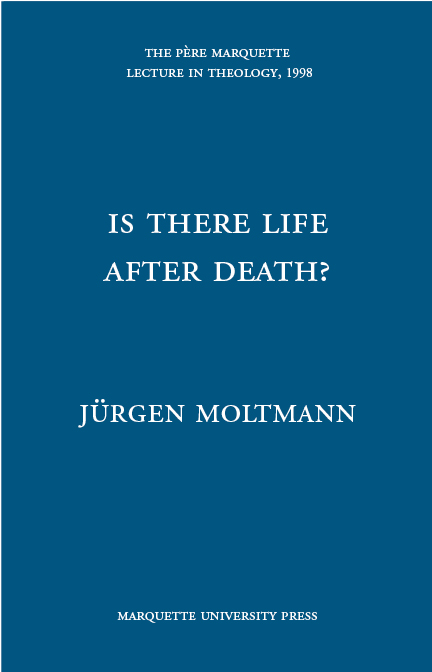Jürgen Moltmann. Is There Life after Death? ISBN 0-87462-578-5 (1998, Lecture 29). $15. 66 pp.
Born into a cultured and well-established family in Hamburg in 1926, Jürgen Moltmann came of age in a world marked by the rise to power of fascism in Germany and Europe’s descent into the chaos of World War II. He served in an anti-aircraft unit during the bombing of Hamburg in 1943, and was then drafted into the Wehrmacht in the following year, only to be captured by allied forces soon thereafter. From 1945 to 1948 he was incarcerated in prisoner-of-war camps on the continent and in England. It was in those camps that he came to Christian faith, as he struggled for hope in what seemed to him the hopelessness of the war’s aftermath. It was there also that he was introduced to Christian theology, receiving his first instruction in the discipline from British theologians. Upon his return to Germany, Moltmann studied at Göttingen, receiving his doctorate in 1952, and then served a rural pastorate in Bremen-Wasserhorst. From 1958 to 1963 he taught at Wuppertal, from 1963 to 1967 in Bonn, and since 1967 has been at Eberhard-Karls Universität in Tübingen, where he was made Professor Emeritus in 1994.
Moltmann’s career can be divided into three periods. The first stretches from his doctoral dissertation at Göttingen under Otto Weber in 1952 through the first years of the 1960s. His publications during this time were primarily concerned with the history of Reformed theology in Germany and France. The second, overlapping the first, dates from the late 1950s and continues through the late 1970s. Its beginning was marked by studies of Dutch Apostolatstheologie, the theology of Bonhoeffer and of Barth, and an initial response to the neo-Marxist philosophy of Ernst Bloch. But his work in this period reaches its high point in the triad of books which constitute his first major publications in systematic theology: Theology of Hope (1964), The Crucified God (1972), and The Church in the Power of the Spirit (1975). Each examines the whole of Christian theology from a single perspective: first from Easter, then from Good-Friday, and finally from Pentecost. The third and last period, dating from the 1980 to the present, has as its centerpiece a series of books called by Moltmann “Contributions to Systematic Theology” which are to form what he terms a “Messianic Theology". Five volumes have appeared thus far: The Trinity and the Kingdom (1980), God in Creation (1985), The Way of Jesus Christ (1989), The Spirit of Life (1992), and The Coming of God (1996). The eight books named above, the three from the middle period and the five volumes of the ‘Contributions,’ constitute the conceptual core of Moltmann’s vast literary production to date.
Jürgen Moltmann is perhaps the most important Protestant theologian of the second half of the twentieth century. His influence on the theological discussions of the last thirty-five years has been correspondingly broad and pervasive. He is a Reformed theologian whose work is marked by a deep commitment to biblical theology, to the Reformation heritage, to ecumenical dialogue, and to the task of bringing contemporary Christianity to a clearer awareness of and a more active engagement with the social implications of the gospel of Jesus Christ. The theme that runs through all his thought, from his earliest turn to Christianity to his latest major publication, is eschatological hope. A matter of existential discovery in the POW camps, this theme became the central concern of his theology in the post-war years, as a now ostensibly ’Christian’ Germany settled into a self-satisfied affirmation of the status quo. In conversation with neo-Marxism, Moltmann fashioned a thoroughly eschatological theology, structured as a dialectic of the cross, i.e., of the death and resurrection of Jesus Christ, and calling for a Christian praxis of social transformation. This self-described ’political theology’ has subsequently had a profound impact on all the forms of liberation theology which have arisen in the past generation around the world. For theologians throughout Latin America and Asia, as well as North America and Europe have found in his work conceptual tools that they have been able to turn to good purpose in their own contexts of suffering and oppression that would crush hope. In addition, from the perspective of his eschatological concern, Moltmann has made profound contributions to such classical issues as the doctrines of God, Trinity, Creation, Christology, Anthropology, Pneumatology and Ecclesiology, as well as to such contemporary questions as that of history, ecology, the practice of ecumenical theology, and social ethics. It is in light of that body of work, that this lecture on life after death should be read.






